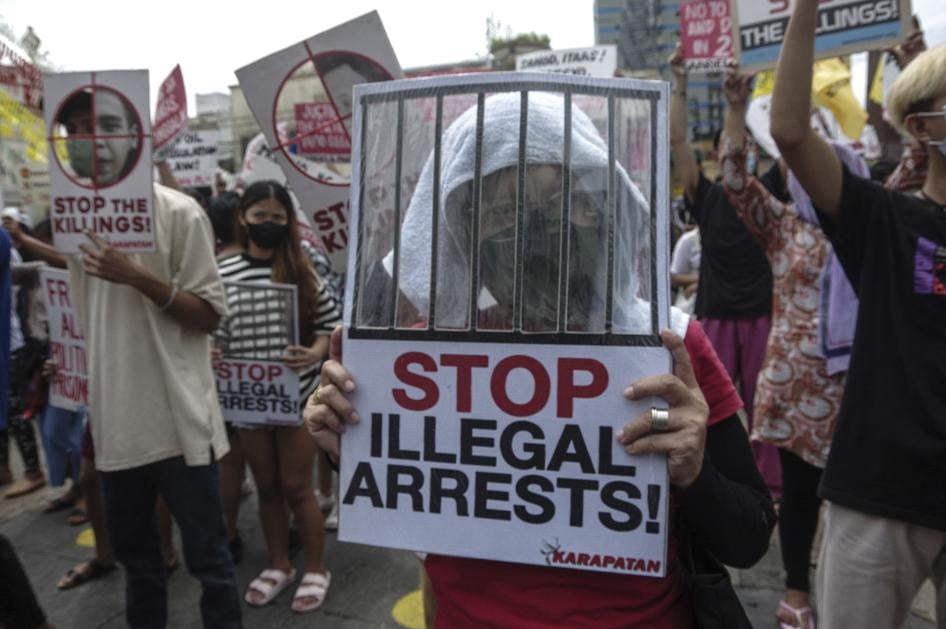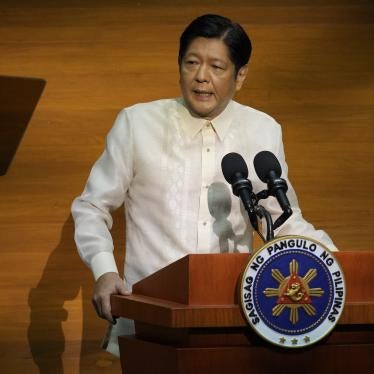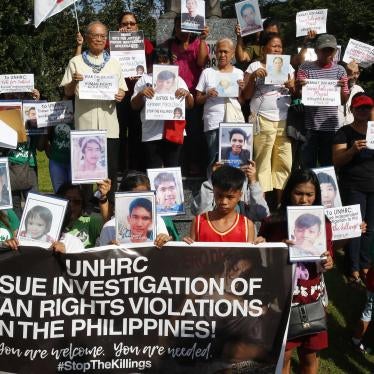(Geneva) – The United Nations Human Rights Council should adopt a strong resolution addressing the dire human rights situation in the Philippines during its 51st session, which starts September 12, 2022, Human Rights Watch said today.
In a policy paper submitted to UN member states, Human Rights Watch said that extrajudicial killings in the Philippine government’s “war on drugs” still occur on a regular basis. Dahas, a program of the Third World Studies Center of the University of the Philippines, has reported 72 drug-related killings after President Ferdinand Marcos Jr. took office on June 30. Official government figures indicate that the police killed 71 people since August 2021, bringing the total number of killings reported by the police between July 2016 and May 2022 to 6,252. President Marcos has not repudiated abuses in the “drug war,” which he said he would continue.
“UN member states should not be fooled by the baseless claims from the new Philippine government that the rights situation has suddenly improved,” said Lucy McKernan, Geneva director at Human Rights Watch. “Continued UN scrutiny of the Philippines is vitally important because ‘drug war’ killings are still common and police impunity for rights violations remains the norm.”
The Office of the UN High Commissioner for Human Rights (OHCHR) calculated in its report to the Council that the death toll was at least 8,663. Domestic human rights groups and the government appointed Philippines Commission on Human Rights state that the real figure of “drug war” killings is possibly triple the number reported in the OHCHR report.
Since the “drug war” began in July 2016 under former President Rodrigo Duterte, the authorities have investigated very few killings implicating the police or alleged government agents. Only 12 police officers have been indicted and only one case, the video-recorded murder of 17-year-old Kian delos Santos in August 2017, resulted in the conviction of police officers.
The prosecutor of the International Criminal Court (ICC) was authorized in late 2021 to investigate alleged crimes against humanity in the “drug war.” In November, the ICC paused the investigation after the Justice Department provided information to the court claiming that the department was conducting a serious independent review of 52 cases involving the police. In June, the ICC prosecutor asked the court to allow his inquiry to continue because the Justice Department review was insufficient and failed to satisfy the requirements to defer the ICC investigation.
Other grave abuses are also continuing, including harassment and extrajudicial killings of activists, environmentalists, journalists, and other human rights defenders, Human Rights Watch said. A long-running “red-tagging” campaign, in which government officials accuse people of links to the armed communist insurgency, further constricts fundamental freedoms and puts those targeted at grave risk of assault or arrest.
President Marcos should take immediate steps to improve the human rights situation, Human Rights Watch said. He should release former Senator Leila de Lima, who has been held in police detention for more than six years on spurious drug charges. And he should appoint independent human rights experts as commissioners to the government Commission on Human Rights so that it can investigate and help prosecute human rights violations.
In 2020, the Human Rights Council passed a resolution that created the UN Joint Program to improve the capacity of Philippine institutions to protect human rights. But more than a year into the three-year program, it is still grappling with organizational and administrative issues, including government actions to thwart the participation of civil society organizations.
UN member states at the Human Rights Council should recognize that the persistence of the human rights crisis in the Philippines makes it important to adopt a strong resolution during the 51st session, Human Rights Watch said. The resolution should create expanded human rights monitoring mechanisms and continue the UN Joint Program. The resolution should explicitly request continued reporting by the OHCHR on the situation in the country.
Such a resolution should call on President Marcos to unequivocally end the “war on drugs” and to prioritize accountability for unlawful killings and other abuses. It should urge the government to form a “truth commission” that will gather testimony from witnesses and victims and their families and make recommendations for achieving justice and ensuring payment of reparations.
The resolution should also call for stopping the practice of “red-tagging” activists and critics of the government, and halting the harassment of journalists and online activists with threats of arrests or criminal libel cases. It should also urge Marcos to release de Lima, to name independent human rights experts to the Commission on Human Rights, and to facilitate the full participation of civil society organizations in the UN Joint Program.
“UN member states should make sure they don’t drop the ball on the Philippines and instead strengthen the Human Rights Council’s efforts to improve human rights in the country,” McKernan said. “Filipinos who suffered the most during the Duterte administration are looking to the Human Rights Council to help them achieve justice for themselves and their loved ones.”
To read the policy paper submitted to the member-states of the UN Human Rights Council ahead of the Council's 51st session, please click here.









